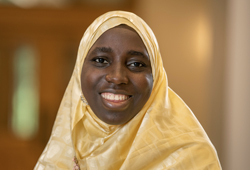
Second-year MGA student Haleemah Ahmad is a researcher, advocate, and peacebuilder focused on reducing violence in local communities through bottom-up programming. Haleemah has been published in the Tony Blair Institute for Change essay collection, served as the editor-in-chief of the Da’wah Institute, and advised the Carter Center on peacebuilding. In this student Q&A, Haleemah shares her journey to the Kroc Institute, her intersectional research interests, and where she sees her career trajectory after graduation.
Why did you decide to pursue the MGA-IPS concentration?
My interest in development work comes from need - the community is missing something. I began to work with local NGOs to address these needs. I volunteered with health-based organizations to distribute medical aid to indigenous people, education organizations to provide instruction to primary school children whose teachers had gone on strike to protest unfair wages, and eventually, organizations addressing violent group recruitment. During this time, I started to focus my research on violent extremism and religious freedom, and I realized that I needed more tools to further my research. I decided I wanted to take my practical experience and define it through theoretical frameworks and lenses to contribute to my advocacy work. That is what drew me to the program.
What has your experience with the Kroc Institute been like thus far?
It is so useful to understand theoretical concepts in peacebuilding fields as both an academic and practitioner. It bridges skill gaps. We have professors here at the Kroc Institute with groundbreaking scholarship and experience in the field, which enables students to learn from the best. Additionally, I have been working in a niche area of the development and peace field, and my classes have exposed me to different sectors and wider contexts. The violent extremism course with Professor Lisa Schirch has been eye-opening for me to learn different iterations of violent extremism.
How does it feel to share your knowledge and expertise in high-level environments such as the Carter Center and Swiss Peace?
I consider it a privilege to speak with stakeholders on issues like religious freedom and violent extremism. It is incredibly important that these international actors are engaging within my context, and they regularly bring good intentions. They try to contribute positively to the situation at hand. For those of us who are working on the ground, maintaining this relationship with donor organizations and interveners is vital. It better informs their practices and allows us to use our voices for change.
What challenges do you encounter in your advocacy work and how do you respond to these challenges?
In my advocacy work, I promote resiliency in violent contexts through comprehensive and holistic approaches. Global organizations need to be sensitive to their positionality in local communities. I advise them to enable local groups to take the lead in activities and be comfortable working in the background. If a large, global organization distributes its logos everywhere, for example, it may alienate its work within a community that is sensitive to outside influence. Personally, I sometimes feel restricted or overwhelmed. I worry, “What changes am I making?” When this happens, I remember what I am doing and why I am doing it. I reach out to my support circle. I think about what still needs to be done. And then I carry on.
Tell us about your internship experience. What did you learn and how do you think it has impacted your work and career ambitions?
I recently completed a six-month field internship with Catholic Relief Services (CRS) in Baltimore, Maryland. I normally work with a local organization that is collaborating with a global organization, so for my internship, I wanted to be on the global organization side. I learned how international organizations contribute to programs from their perspective and position, and the impact of inclusivity in peacebuilding efforts, as well as how to give technical advice for programs in various countries across the world. I have a better idea of challenges and interventions to peacebuildings.
Where would you like your post-graduation career to go?
It’s challenging to narrow down one track, but I want to continue to do advocacy work with global stakeholders and connect them to local organizations. I want to synthesize the local with the global, and journey to new places through my work.
Where do you see yourself on the Strategic Peacebuilding Wheel?
I see myself prominently in three of these dimensions: violence prevention/conflict response/transformation; education; and nonviolent social change. It’s all intersectional. In my work, we recognize and acknowledge that many of these communities are susceptible to violent group recruitment due to inefficiencies within social structures. It’s not enough to say, “Violence is not the answer.” You must provide an alternative. The society that produces violence must be transformed.
Originally published by at kroc.nd.edu on April 04, 2023.